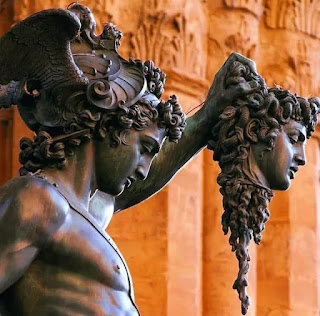I wish to argue that she is a depiction of the ancient power of clairvoyance, what in the East is called the power of the serpent, or the Kundalini. The snakes coming out of Medusa’s head show this ancient force of clairvoyance gone wild and having become a danger, so that any human being exposed to this force could become paralyzed in their own being. They could become imprisoned through not having a free relationship to the visions arising through their clairvoyance.
We can understand this if we recall that sometimes when we are dreaming we feel that events take place without our free initiative, and consequently we feel powerless. This analogy reveals something of the quality of this ancient clairvoyant faculty that all human beings possessed at that time.
In the legend of Perseus, the young Greek hero, who represents the new faculty of intelligence, decides he will slay Medusa.
How is he going to do this when Medusa has such a terrifying appearance that just one look from her is sufficient to turn him to stone? Perseus is aided in his conquest of Medusa by Athena, goddess of wisdom.
Here we see another indication that Athena, as an aspect of the Divine Sophia, was really behind the transition in evolution from clairvoyance to the development of human intelligence and thought.
Athena accompanies Perseus to the domain of Medusa, and she holds up her shield so that Perseus can see the reflection of Medusa without looking at her directly. Walking backwards with the shield of Athena, Perseus engages in battle with Medusa and in his victory he cuts off her head. Here we see the application of intelligence to overcome the terrifying power of ancient clairvoyance.
The transition from ancient oriental clairvoyance to Greek rational thought is further highlighted in the legend of Andromeda and Perseus. Andromeda was the daughter of Cepheus and Cassiopeia, king and queen of Ethiopia. Their beautiful daughter Andromeda in a certain respect, like Helen of Troy, represents the soul of the world. Andromeda was dearly loved by Cepheus and Cassiopeia. However, a sea monster began to threaten the country, causing great destruction. An oracle revealed to the king and queen that the only way to save their country from destruction by the sea monster Cetus, who was like an enormous whale, was through the sacrifice of their daughter Andromeda. Symbolically the soul of humanity, represented by Andromeda, is being threatened by an atavistic force of the will, represented by the sea monster Cetus, a force from the depths. Through the constructive use of this atavistic force of the will, great structures such as the pyramids in Egypt and Stonehenge in the British Isles were built in antiquity. This constituted an enormous strength of will. But, just as ancient clairvoyance was a threat to the development of human freedom, so too this atavistic force of will was a threat to the development of independence. The task of saving Andromeda fell to Perseus. At the very moment when Andromeda was bound to a rock and was about to be devoured by Cetus, Perseus appeared holding the head of Medusa, and turned her evil eye upon Cetus. The sea monster was turned to stone. Here we see the use of intelligence to overcome the atavistic power of the will, all of this under the guidance and inspiration of Athena, the goddess of wisdom, an aspect of Divine Sophia.
In the myth of Perseus we see the representative of the new Greek consciousness, as one who uses his intelligence and his power of thought in order to be guided through life.
Perseus, of course, is a mythological figure, whereas Odysseus, whom Homer tells us was the key figure in the conquest of the city of Troy through the use of intelligence, was an actual Greek personality. We know that the Trojan War actually took place, because the German archeologist Heinrich Schliemann was inspired and guided to the actual site where the Trojan War took place and was able to rediscover the city of Troy. In the story of the Greeks re-capturing Helen of Troy, representing the soul of humankind, in turn related to Divine Sophia, we see symbolically how the love of Sophia played an important part in the emergence of Greek civilization.
- Robert Powell, The Sophia Teachings, The Emergence of Divine Feminine in Our Time -Page 26-29


No comments:
Post a Comment